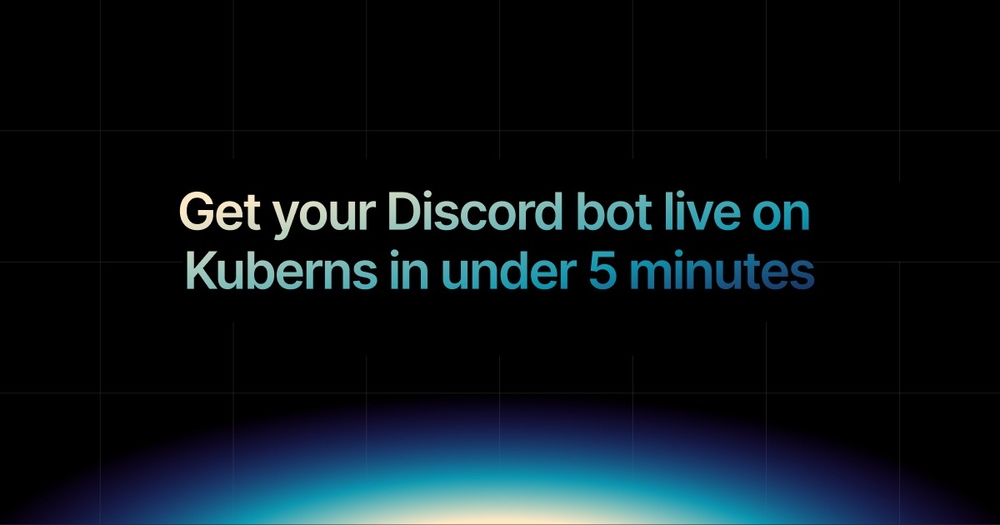Published
- 5 min read
Get your Discord bot live on Kuberns in under 5 minutes

If you’re searching for how to deploy your Discord bot and keep it running 24/7, you’re in the right place. Most tutorials show you how to build a bot, but they stop short of answering the one question that matters once you’re done coding: “How do I host this thing so it actually stays online?”
Most hosting options are either too complex or come with unexpected limitations.
If you’re reading this, chances are you’re looking for a way to host your Discord bot 24/7, without needing to deal with cloud infrastructure, Dockerfiles, or constant restarts.
In this guide, we’ll show you how to deploy a Discord bot using Kuberns, a modern, developer-first platform that simplifies cloud deployment.
Let’s walk through it.
What Is a Discord Bot?
A Discord bot is an automated program that interacts with users in a Discord server. Bots can perform a wide range of tasks like respond to commands, manage roles, moderate content, play music, fetch data from APIs, or even run games.
Developers typically build them using libraries like discord.js (JavaScript) or discord.py (Python).
Most bots are event-based.
They listen for triggers like a new message or a user joining a channel and respond with a pre-programmed action. This architecture makes bots lightweight and easy to test locally.
However, running the bot from your local machine is only practical during development. Once you’re ready to go live, you’ll need a reliable hosting solution to keep the bot online and responsive at all times.
Why Kuberns Works Better for Hosting Discord Bots?
A lot of developers start by using free or popular hosting platforms such as Replit, Heroku, or Glitch. Initially, these services seem like a good fit for small projects but they come with limitations that become obvious pretty quickly.
For example:
- Replit projects sleep after periods of inactivity unless you’re on a paid plan.
- Heroku has removed its free tier, and even the paid plans require setup steps like defining a Procfile or using CLI tools.
- Glitch is unreliable for persistent, event-driven applications like bots due to slow startup times and frequent crashes.
Other options include spinning up a VPS, configuring a Linux environment, installing dependencies, and managing uptime with tools like PM2 or Systemd.
That works, but it requires DevOps skills, and it’s time-consuming for what should be a simple task.
Kuberns removes these barriers by offering a deployment platform that doesn’t assume you’re a cloud engineer.
It provides:
- Continuous uptime with no sleep timers or idle shutdowns.
- Instant deployment from GitHub.
- Automatic detection of your app’s environment (Node.js, Python, etc.).
- Secure environment variable management.
- Real-time logging and easy redeployments.
And importantly, Kuberns does not require Docker, YAML files, or cloud configuration.
The process feels more like connecting a repo and clicking “Deploy”, because that’s essentially what it is
Step-by-Step: How to Deploy Your Discord Bot on Kuberns
Here’s how to go from “code on your laptop” to “bot running 24/7 on the cloud” in under 5 minutes.
Push Your Bot Code to GitHub
If your bot isn’t already on GitHub, start by uploading it.
Your repo should include:
- Your main bot file (index.js, bot.py, etc.)
- A dependency file:
- For Node.js: package.json
- For Python: requirements.txt
If you’re using environment variables (you should be!), don’t upload .env files to GitHub. We’ll set those in Kuberns.
Link Your Repo to Kuberns
- Go to dashboard.kuberns.com and sign in with GitHub
- Click “Create New App”
- Select your Discord bot repo and choose the branch you want to deploy
- Kuberns will detect your project’s language and runtime automatically
No need to configure servers, ports, or Dockerfiles. It just works.
Set Your Discord Bot Token as an Environment Variable
 Discord bots require a token to connect to the Discord API. That token should never be hardcoded in your code.
Discord bots require a token to connect to the Discord API. That token should never be hardcoded in your code.
Here’s how to set it properly in Kuberns:
- After connecting your repo, add a new environment variable:
- Name: DISCORD_TOKEN
- Value: your actual bot token from the
Then, update your code to read the token from the environment:
In Node.js (discord.js):

In Python (discord.py):
 This way, your token stays secret, and Kuberns injects it during deployment.
This way, your token stays secret, and Kuberns injects it during deployment.
Deploy Your Bot
Once your repo is connected and your environment variables are set, return to the “Overview” tab and click “Deploy”.
Kuberns will:
- Install dependencies automatically
- Start your bot using the right command (node index.js, python bot.py, etc.)
- Keep it alive and running in the cloud
You can also view real-time logs to debug or monitor activity.
Once the deployment finishes, your bot will show up as online in Discord. Try typing a command or using an event, it should respond instantly.
No terminal open. No server to manage. Just your code, running in the cloud 24/7.
Ready to Deploy Your Discord Bot?
You’ve already done the hard work by writing the bot logic, hosting it shouldn’t involve complex process with cloud infrastructure, containers, or hidden limitations.
With Kuberns, you get a streamlined deployment experience that’s fast, reliable, and built for developers who want to focus on writing code, not managing servers.
You don’t need to learn Docker. You don’t need to keep your computer awake. And you don’t need to babysit a free hosting plan that shuts off every few hours.
If you’ve been looking for a way to host your Discord bot 24/7, without the DevOps overhead, this is it.
Try it for yourself.
👉 Deploy your Discord bot now using Kuberns
It only takes a few minutes to go live, and you’ll never worry about uptime again.
